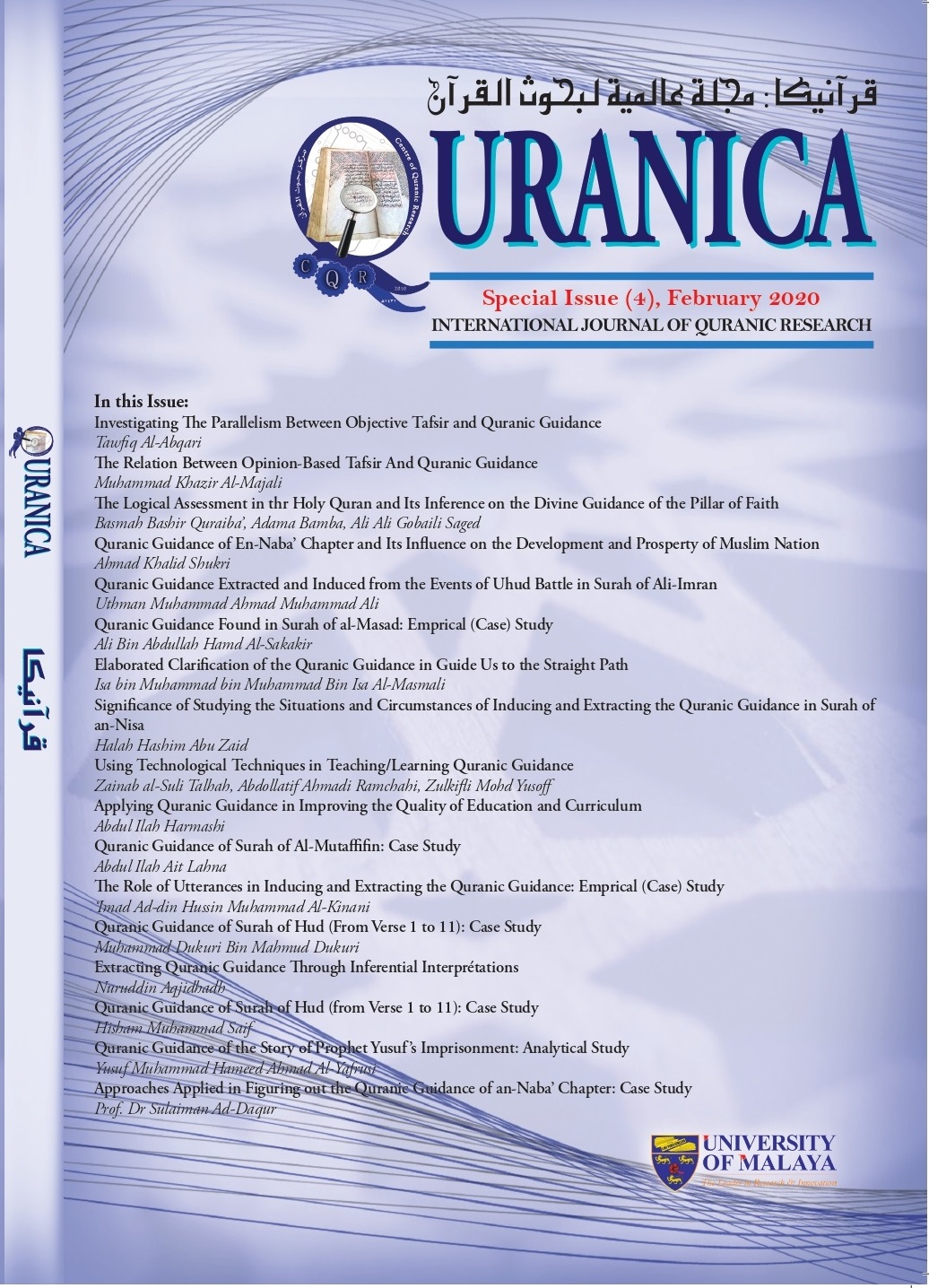al-‘Alāqah baina al-Tafsīr bi al-Ra’yi wa al-Hidāyāt
Main Article Content
Abstract
This study discusses the nature of the relation between thought/opinion-based interpretation (tafsir) and the guidance of the Qur’an. Undoubtedly, mediation is one of the main goals of the Qur’an. Allah (SWT) says (كتاب أنزلناه إليك مبارك ليدّبّروا آياته، وليتذكر أولو الألباب) literally translated to “[This is] a blessed Book which We have revealed to you, [O Muhammad], that they might reflect upon its verses and that those of understanding would be reminded” (38:29). There are two verses in the Qur’an that strongly encourage and emphasize the extreme importance of contemplation i.e. Allah (SWT) says that (أفلا يتدبرون القرآن، أم على قلوب أقفالها) literally translated to “then do they not reflect upon the Qur'an, or are there locks upon [their] hearts?” (27:24) and (أفلا يتدبرون القرآن، ولو كان من عند غير الله لوجدوا فيه اختلافا كثيرا) literally translated to “then do they not reflect upon the Qur'an? If it had been from [any] other than Allah, they would have found within it much contradiction” (4:82). Allah (SWT) also says that (ولقد يسرنا القرآن للذكر، فهل من مدّكر) literally translated to “and We have certainly made the Qur'an easy for remembrance, so is there any who will remember?” (54:17). Furthermore, Allah (SWT) describes the Qur’an as (الٓمٓ - ذَٰلِكَ ٱلۡكِتَٰبُ لَا رَيۡبَۛ فِيهِۛ هُدًى لِّلۡمُتَّقِينَ) literally translated to “this is the Book about which there is no doubt, a guidance for those conscious of Allah” (2:2). In respect of inference, Quranic discourse consists of first direct/explicit inferences and indirect/implicit references, which require scholars to deeply investigate the multifaceted layers of meanings and interpretations. This shows the fact that Qur’an is tremendously full of miracles that scholars keep digging for and that Qur’anic meaning and interpretations are endlessly as abundant as seven or more seas. Thought/opinion-based interpretation is strongly related to the Quranic terminologies -meditation and contemplation. The aim of this study is to analytically and inductively draw the relation between thought/opinion-based interpretation and the guidance of the Qur’an. To analyse the collected data, the study adopts inductive analytical research method in order to answer the questions concerning the relation between thought/opinion-based interpretation approach and the guidance of the Qur’an. The significance of this study lies in the fact that thought/opinion interpretation is a key for the guidance of the Qur’an and that it may end up with debates regarding the credibility and acceptability of thought/opinion Tafsir complied with the rules of the majority of scholars.
Downloads
Article Details
Disclaimer
QURANICA makes every effort to ensure the accuracy of all its contents. However, opinions, discussions, views and recommendations are expressed in this journal do not necessarily reflect the official policy of QURANICA or views of its editors or publishers. Therefore, QURANICA and its publishers will not be liable for any controversy may be arisen. The journal reserves the right, at its sole discretion, to change its terms and conditions of publications.
Copyright
It is a condition of publication that manuscript submitted to the journal have not been published, accepted for publication, nor simultaneously submitted for publication elsewhere. By submitting a manuscript, the author(s) agrees that copyright for the article is transferred to the publisher, if and when the manuscript is accepted for publication.
